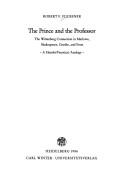| Listing 1 - 5 of 5 |
Sort by
|
Book
Year: 1909 Publisher: Halle a. S.: Niemeyer,
Abstract | Keywords | Export | Availability | Bookmark
 Loading...
Loading...Choose an application
- Reference Manager
- EndNote
- RefWorks (Direct export to RefWorks)
Book
Year: 1910 Publisher: Halle a. S.: Niemeyer,
Abstract | Keywords | Export | Availability | Bookmark
 Loading...
Loading...Choose an application
- Reference Manager
- EndNote
- RefWorks (Direct export to RefWorks)

ISBN: 9783533037927 9783533037910 3533037916 3533037924 Year: 1986 Publisher: Heidelberg: Winter,
Abstract | Keywords | Export | Availability | Bookmark
 Loading...
Loading...Choose an application
- Reference Manager
- EndNote
- RefWorks (Direct export to RefWorks)
Book
ISBN: 0691063044 1322886733 0691617058 1400871689 9781400871681 9780691617053 9780691063041 0691644225 9780691644226 Year: 2015 Publisher: Princeton, NJ : Princeton University Press,
Abstract | Keywords | Export | Availability | Bookmark
 Loading...
Loading...Choose an application
- Reference Manager
- EndNote
- RefWorks (Direct export to RefWorks)
This book interprets Mon Faust and explores the differences between Valéry's and Goethe's treatments of the Faust figure. The author shows by close analysis how Valéry opposes a Cartesian, anti-Pascalian Faust to Goethe's romantically flawed hero. The title of the project conceived by Valéry's Faust, The Mind's Body-part autobiography, part metaphysical treatise-embodies the Cartesian dilemma ironically illustrated by the Mon Faust fragments: the misfortunes of the thinking essence, the cogito, in its subjugation to the body. The first three chapters examine the Cartesian character of a Faust engaged in superhuman but vain attempts to reconcile the intellect and the libido. A fourth chapter discusses the differences between Goethe's and Valéry's protagonists and as well between Goethe and his Faust. Throughout the book the author explores Valéry's linguistic experimentation, which, through charades, paranomasia, onomastics, and etymological puns, brings into full play the mystifying and mythologizing aspects of language. To resolve the stylistic problems associated with this fragmentary work the author adapts the tone of his exegesis to the diverse stylistic levels of Mon Faust. His analysis illuminates the Cartesian potential inherent in Valéry's protagonist.Originally published in 1976.The Princeton Legacy Library uses the latest print-on-demand technology to again make available previously out-of-print books from the distinguished backlist of Princeton University Press. These editions preserve the original texts of these important books while presenting them in durable paperback and hardcover editions. The goal of the Princeton Legacy Library is to vastly increase access to the rich scholarly heritage found in the thousands of books published by Princeton University Press since its founding in 1905.
French and German. --- German and French. --- Faust, Johann, --- Faust, Johannes, --- Faustus, --- Faustus, Georg, --- Faustus, John, --- פאוסט --- French and German --- German and French --- Valery, Paul --- Comparative literature --- Faust, --- Goethe, Johann Wolfgang von, --- Valery, Paul, --- In literature. --- Valéry, Paul, --- In literature --- Faust --- Doctor Faust --- Doctor Faustus --- Dr. Faust --- Dr. Faustus --- Faustus --- Comparative literature - French and German --- Comparative literature - German and French --- Valéry, Paul, - 1871-1945 - Mon Faust --- Goethe, Johann Wolfgang von, - 1749-1832. - Faust --- Faust, - -approximately 1540 - In literature --- Faust, - -approximately 1540
Book
ISBN: 1787444724 1640140433 9781640140431 Year: 2019 Publisher: Rochester (N.Y.): Camden House,
Abstract | Keywords | Export | Availability | Bookmark
 Loading...
Loading...Choose an application
- Reference Manager
- EndNote
- RefWorks (Direct export to RefWorks)
The Faust legend, which has come down to us most famously in Goethe's tragedy but also in countless other incarnations since the late sixteenth century, was first collected and presented as a cohesive narrative (in manuscript) by Christoph Rosshirt during the 1570s. Rosshirt was also the first to provide illustrations of Faust, hand-colored by Rosshirt himself. This book offers a critical edition of Rosshirt's six tales, including an introductory chapter, a fascimile of the manuscript, a transcription and first-ever English translation on facing pages, as well as a history of Faust illustrations, with Rosshirt's own illustrations and other examples up through Delacroix, the most complete survey of such illustrations to date. A final chapter rounds out the study with an assessment of Rosshirt's significance for the Faust tradition, a review of the evidence for a historical Faust, and a rejection of his historicity (because it is unprovable) in favor of his existence only in his story - a story Rosshirt helped to tell - and in our imaginations that animate that story.
Faust --- Rosshirt, Christoph, --- Doctor Faust --- Doctor Faustus --- Dr. Faust --- Dr. Faustus --- Faustus --- Criticism and interpretation. --- In literature. --- Illustrations. --- Art. --- Faust (Legendary character) - Legends --- Faust (Legendary character) - In literature --- Faust (Legendary character) - Art --- Rosshirt, Christoph, - -1586 - Criticism and interpretation --- Rosshirt, Christoph, - -1586 - Illustrations --- Faust (Legendary character) --- Rosshirt, Christoph, - -1586 --- LITERARY CRITICISM / European / German. --- Christoph Rosshirt. --- Critical Edition. --- English Translation. --- Faust Illustrations. --- Faust Legend. --- Faust Tales. --- Faust Tradition. --- German Heritage. --- German Narrative. --- German Novelist. --- Historical Analysis. --- Historicity. --- J.M. van der Laan. --- Middle Ages.
| Listing 1 - 5 of 5 |
Sort by
|

 Search
Search Feedback
Feedback About UniCat
About UniCat  Help
Help News
News